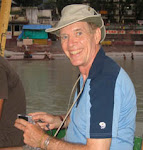Traffic. Flooded roads. Travel delays. I am sure you have experienced them, as have I. However, never have I experienced them in the same was as in India.
September 5 (continued): Shortly after leaving for Gangotri, we find that the road ahead is blocked by a landslide. We turn around, and head back a few minutes to the last village we had passed. There is time for breakfast. As we enter the small eatery (I am not sure that I have ever seen an American equivalent), our guide and drivers have already started assisting the proprietor at the stove. Soon we are being served chai, freshly prepared bread (one of the many forms that bread takes in India, though I don’t remember which), and butter. There is a school located up the hill behind us, and as we eat several boys come in the buy new pens. I am sitting at the front table, closest to the cash register, and observe these transactions. For most, it is a quick exchange, pen for rupees. Then one young boy, perhaps eight or nine years of age, comes in. He must try the pen, then another, and yet another. The clear plastic barrels, the colored caps, the ink are all the same yet he tests each one, comparing the results, before finally settling on one of them. I wonder whether this is a habit that will follow him through life, and how it will serve him.
Breakfast is leisurely. We know that when we get back on the road, it will be open or it will still be blocked. There is no need to rush to find out.
be blocked. There is no need to rush to find out.
September 5 (continued): Shortly after leaving for Gangotri, we find that the road ahead is blocked by a landslide. We turn around, and head back a few minutes to the last village we had passed. There is time for breakfast. As we enter the small eatery (I am not sure that I have ever seen an American equivalent), our guide and drivers have already started assisting the proprietor at the stove. Soon we are being served chai, freshly prepared bread (one of the many forms that bread takes in India, though I don’t remember which), and butter. There is a school located up the hill behind us, and as we eat several boys come in the buy new pens. I am sitting at the front table, closest to the cash register, and observe these transactions. For most, it is a quick exchange, pen for rupees. Then one young boy, perhaps eight or nine years of age, comes in. He must try the pen, then another, and yet another. The clear plastic barrels, the colored caps, the ink are all the same yet he tests each one, comparing the results, before finally settling on one of them. I wonder whether this is a habit that will follow him through life, and how it will serve him.
Breakfast is leisurely. We know that when we get back on the road, it will be open or it will still
 be blocked. There is no need to rush to find out.
be blocked. There is no need to rush to find out. In fact, we discover that the landslide that allowed us breakfast has been cleared. However, not many kilometers ahead there is another. This one is much more substantial. As we drive toward it we pass a huge bulldozer starting to warm up. It will be a few hours before it passes us, parked on the side of the road. When we travel as far as we can, we pull to the side of the road and park. The parking is a bit random, some vehicles on one side of the road, some vehicles on the other. There are buses of pilgrims, taxis, motor scooters, cars, and trucks. Everyone knows that we will be here for hours. I confirm that for myself firsthand when I walk down the road to see the massive rocks blocking our way.
 Imagine this. You have a travel itinerary, a destination. The plan is to drive to Gangotri, drop some gear at a guesthouse, and begin the next trek. Instead, you and hundred of others will be waiting for an apparently significant period of time on a mountain road. For us, the experience was very Indian, amazing, and thought provoking.
Imagine this. You have a travel itinerary, a destination. The plan is to drive to Gangotri, drop some gear at a guesthouse, and begin the next trek. Instead, you and hundred of others will be waiting for an apparently significant period of time on a mountain road. For us, the experience was very Indian, amazing, and thought provoking. Some took the opportunity to nap, either in their vehicles or along the rocks on the side of the road. Others read. People walked up and down, stopping to meet others and to talk. We had passed a waterfall shortly before we stopped. The sun was out, so it became a place for people to do their laundry. Some (myself included) set shoes and clothes out in the sun to dry. There was dancing and singing. There were processions of pilgrims. What was missing was the anger, the vitriol, the impatience, the honking of horns, the expressions of rage that such a circumstance would have elicited anywhere I had ever been before.

Eventually, the road was opened. It took a bulldozer, dynamite, and a large road crew. It is 3:10 in the afternoon; we have been here over six hours. People move back to their vehicles and, slowly, our pilgrimages resume. We reach our destination three hours later. Tonight we will spend at a guesthouse in Gangotri. Landslides happen, itineraries change. It is about the journey. Namaste





